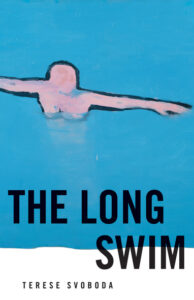‘We slather on American mayo’
The Long Swim
by Terese Svoboda
Amherst: University of Massachusetts Press, 2024
$24.95 / 9781625348074
Reviewed by Jessica Poon
*

In literary circles, it is often said that nobody reads short stories, short stories don’t sell, literature is DOA and TikTok is the future, present, past, and rapidly coming out of your urethra. Or something. The generally poor sales of short story collections that actually do get published, are, partly attributable to publishers’ limited marketing budgets that become self-fulfilling prophecies.
If we take Short Stories Don’t Sell as truth, however anathema, then, in light of everyone’s addled attention spans, then, it’s crucial to have an irresistible first sentence. A sentence so maddeningly seductive that your phone becomes, however momentarily, irrelevant.
Although it’s commonplace to recommend a TV show with a proviso along the lines of “It gets really good in the second season”—a practice that ought to be illegal—this kind of enduring forgiveness and assumed tolerance for delayed gratification doesn’t usually apply to short stories, or literature. One might be forgiven for assuming that worsened attention spans would make short stories an easier sell than novels, by virtue of being shorter, but this is not the case. Ideally, short stories slap from the onset, if they have the slightest chance of getting read.
Victoria resident Terese Svoboda’s (Roxy and Coco) collection of flash fictions and short stores is contemporary, exuberant, and zany. Many of her opening sentences slay. Characters seldom, if ever, undergo genuine metamorphoses—which, arguably, mimics life—but they certainly make zippy observations and do quirky things. Dogs are often involved. Quotation marks for dialogue are absent. Her stories often end with moments that feel in media res, rather than a resolute end.

In “Swordfished in Nantucket,” for instance, the narrator observes her husband’s extensive family—which includes a veteran, a Texan, and a Coloradan—while on vacation in Nantucket. Svoboda excels at making punchy throwaway sartorial details. For instance: “Let’s go to the lost graveyard today, says his brother, wearing pajamas of the demanding sort, two plaids.” A pun is deployed judiciously: “I always believed my body was a prison, says the Texan. I was right. In biology I learned it was made of cells.” For a gem of a simple sentence with a strong image, there’s “We slather on American mayo.”
In “Oxford,” the narrator’s evocation of irrational young love is pitch-perfect. Svoboda’s own evident appreciation for language extends to her characters:
Right. Could be love. I did not say that aloud but instead hugged the waist of a boy called Graham, a name with a sigh built in, as he steered the motorbike I was trying not to fall from. I also wondered why what we were riding was called a motorbike here. Motorcycle sounded way cooler.
Thus my interests.
In describing Graham’s nonexistent communication, the narrator says, comedically, “I put that down to a general manly dislike of writing, his recognition of the distance between us, and, with regard to my impending philosophy degree, our divergent interests. … He’s got twelve children by now, I said. And they all drive little motorbikes in circles around him.”
In “Rex Rhymes with It,” the opening line is: “I have flown home to harass my mother into living longer to spite Dad, who has been dead for some time now.” It’s giving Camus, but with a livelier sense of humour.
In “The Long Swim,” the characters don’t swim much. Instead, they take a family picture, they observe their dog, they use a flashlight to try and find turtles, they stand in the sand.
In “Frangipane,” there is much to admire about this exchange of dialogue:
Did you know, I say, these flowers—I shake off his arm in the act of pointing—are most fragrant at night, but they have no nectar and dupe their pollinators?
There are always two sides to a story, he laughs. I have a spare room in Phoenix, for instance.
On closer scrutiny, what does the spare room in Phoenix have to do with flowers duping their pollinators? Is the man answering the narrator with a non sequitur, being intentionally inscrutable?
The best comparison I can think of comes from, of all places, a Sandra Bullock movie, The Lost City. Bullock’s character is being rescued, improbably, by Brad Pitt. Bullock’s character asks, “How are you so handsome?” Pitt’s character says, “My dad was a weatherman.” Pitt has answered the question in a way that makes sense, though not in the most linear, obvious way. Notably, he does not repeat any of Bullock’s words back to her in his answer, which heightens the impression of having the answer seem like a non sequitur. It’s these relevant yet offbeat details that make for memorable dialogue, which Svoboda achieves here.
In “Christ and Three Geese and What Happened to the Boy Afterward”—long titles are a risk, especially if your name is neither Fiona Apple nor Italo Calvino, but this risk pays off—sisters are described as having “the little door-answering life they live,” which conveys so much with notable economy.
In “The Bulkhead,” what the narrator says and what she feels are different: “What she wanted to tell him was that her thirty-year-old son’s doctor said he’d need a new liver if he didn’t stop drinking, so her son ordered a case of Beaujolais to celebrate. Instead, she said the dog needed his leash, and walked home.” These two sentences juxtapose each other and are commendably concise and precise.
I once had a discussion with an author about the definition of plot. She told me that she used to think of plot as things happen, a definition I found agreeable, if broad. After a writer’s workshop, though, she was told this rudimentary definition was incomplete. To qualify as plot with a capital P, causation is required. Things happening as a result of clear-cut causation is not the backbone of these stories. That’s not to say there’s zero causation, nor are these stories plotless. Rather, it’s the way these stories—often profuse with verbs and therefore action, with humorous observation and stylistic verve—are told, that is the point.

*

Originally from East Vancouver, Jessica Poon is a writer, former line cook, and pianist of dubious merit who recently returned to BC after completing a MFA in Creative Writing at the University of Guelph. [Editor’s note: Jessica Poon has recently reviewed books by Wendy H. Wong, Andromeda Romano-Lax, Sarah Leipciger, Katrina Kwan, Shelley Wood, Richard Kelly Kemick, Elisabeth Eaves, Rajinderpal S. Pal, Keziah Weir, Amber Cowie, Robyn Harding, Roz Nay, Anne Fleming, Miriam Lacroix, Taslim Burkowicz, Sam Wiebe, Amy Mattes, Louis Druehl, Sheung-King, Loghan Paylor, Lisa Moore (ed.), Sandra Kelly, and Robyn Harding for BCR]
*
The British Columbia Review
Interim Editors, 2023-25: Trevor Marc Hughes (non-fiction), Brett Josef Grubisic (fiction and poetry)
Publisher: Richard Mackie
Formerly The Ormsby Review, The British Columbia Review is an online book review and journal service for BC writers and readers. The Advisory Board now consists of Jean Barman, Wade Davis, Robin Fisher, Barry Gough, Hugh Johnston, Kathy Mezei, Patricia Roy, Maria Tippett, and Graeme Wynn. Provincial Government Patron (since September 2018): Creative BC. Honorary Patron: Yosef Wosk. Scholarly Patron: SFU Graduate Liberal Studies. The British Columbia Review was founded in 2016 by Richard Mackie and Alan Twigg.
“Only connect.” – E.M. Forster































One comment on “‘We slather on American mayo’”